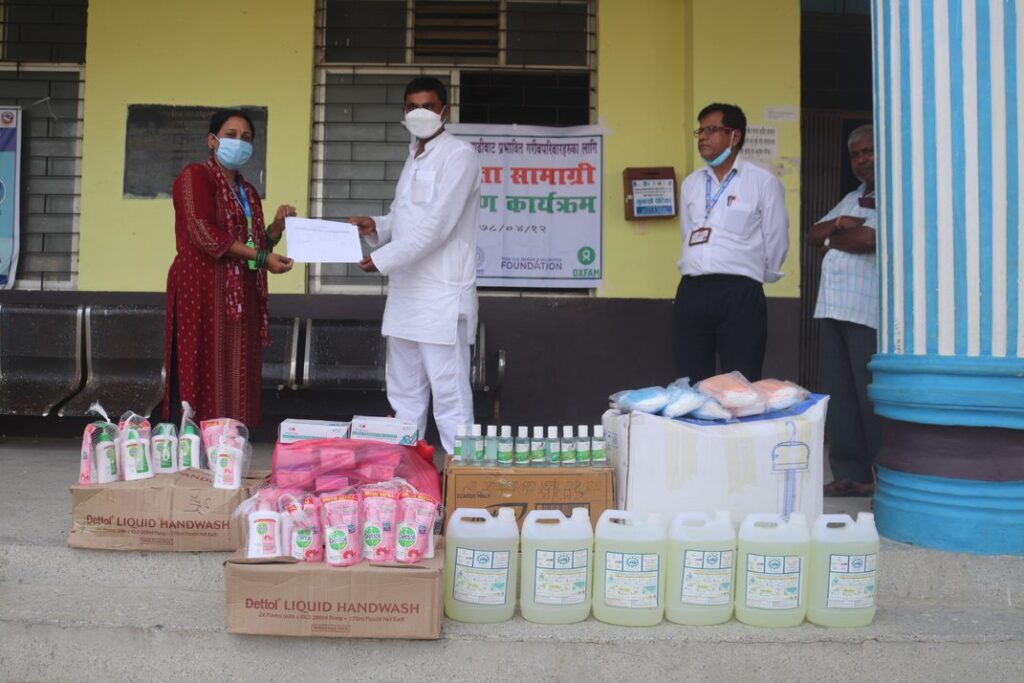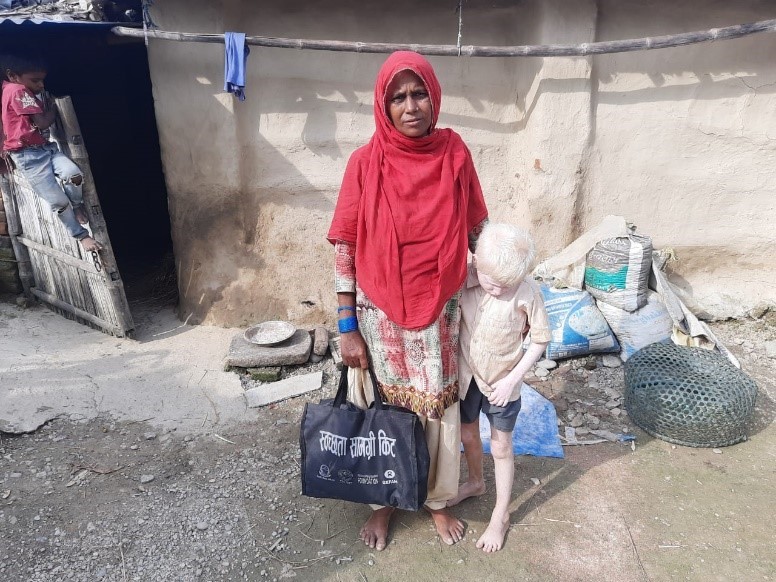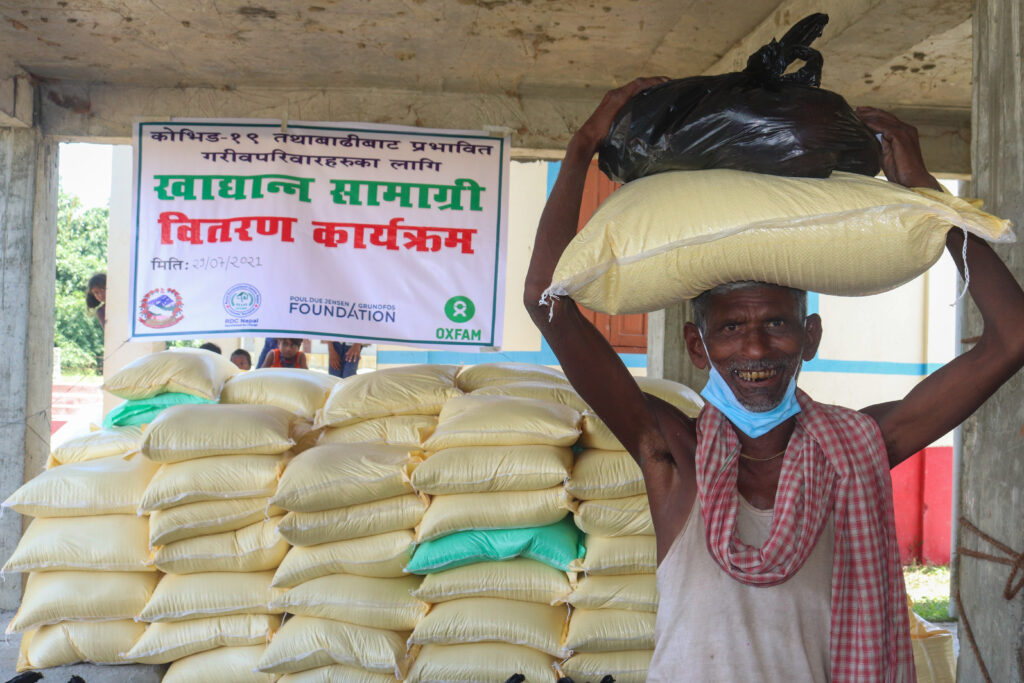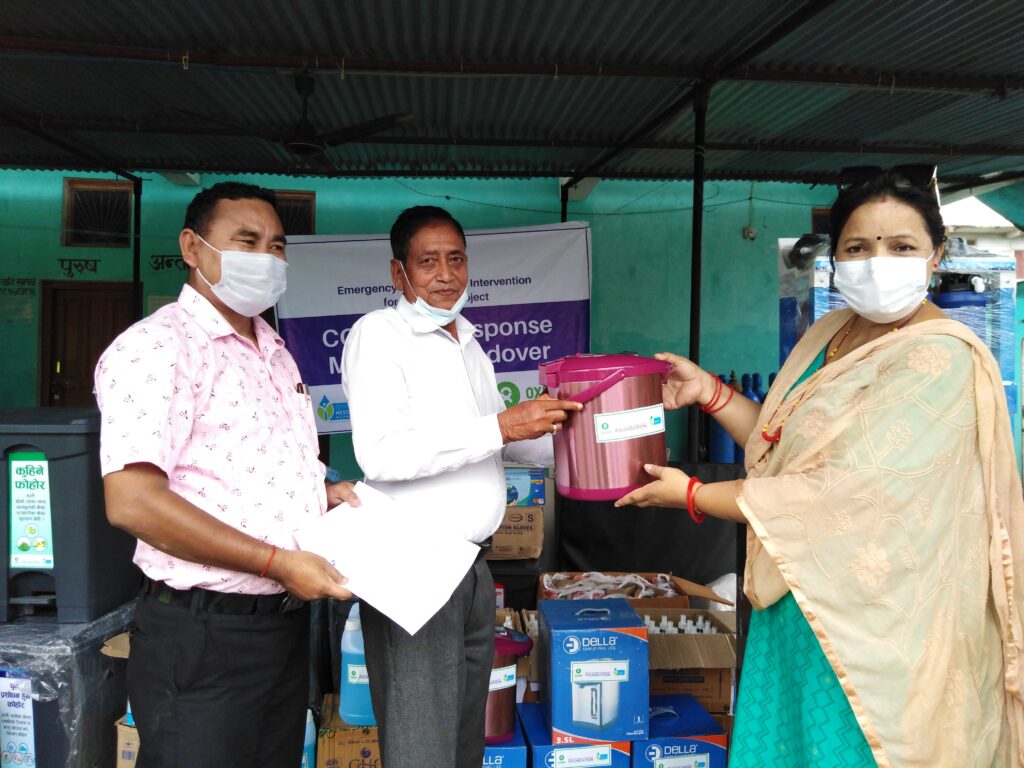By Sherrell Perkin and Sarah Marioni, Oxfam GB
Oxfam and the Grundfos Foundation were fortunate in already enjoying a long-term partnership, working together in Nepal to improve access to safe water for rural communities. Thus, when COVID-19 struck in 2020, we were in a strong position to work together in planning a rapid response to help safeguard those communities with whom we were working.
For Oxfam, it was immediately clear that much of our traditional work – in providing clean water supplies, promoting safe hygiene practices and addressing livelihood insecurities – had never been more needed. But they acquired additional urgency as the pandemic struck – devastating communities, stretching inadequate healthcare facilities to breaking point and wreaking havoc with livelihoods when lockdowns effectively severed people’s ability to earn their living.
The Foundation quickly assessed the new reality and was able to offer exactly the kind of flexibility that was needed in terms of repurposing vital funds to meet the need that presented itself. Throughout 2020, Oxfam and Grundfos Foundation worked together with other local partners to offer a first response reaching almost 40,000 people and 73 different health facilities with vital sanitation infrastructure, handwashing facilities, medical equipment, PPE, hygiene kits, water and public health messaging (as highlighted elsewhere on the website in this blog by Oxfam’s Lyndsay Stecher).
An ongoing crisis
However, in 2021, further waves of the virus struck, proving even more deadly and destructive than the first, with the mass return of migrants across open borders, and long lockdowns slashing people’s income and pushing them deeper into poverty. The Foundation stood by these vulnerable communities, supporting Oxfam and partners to continue to deliver life-saving assistance with further funding. A new response was mounted from June to October 2021, working in 3 existing areas (Sarlahi, Rautahat and Kanchanpur), and expanding into 5 new districts where Oxfam’s partners were already operating – including the capital Kathmandu (30 municipalities in total).
Together, we managed to reach 9 schools, 22 health posts, 13 isolation centres and 6 COVID hospitals – benefitting over 67,000 people directly with water, sanitation and hygiene materials, food and medical supplies, and a further 120,000 indirectly with essential health messaging. In addition to supporting hospitals and healthcare facilities with toilet construction, sanitizers, water filtration, PPE and vital medical equipment and supplies, the project also worked at the community level, providing over 3,000 hygiene kits and isolation kits direct to the most vulnerable households to help control the spread of infection.
The lack of a government protection scheme meant that we had identified food insecurity as a growing risk within communities, so the project also provided food packages to over 2,000 severely impacted families, with enough rice, lentils, cooking oil, sugar and salt for a full month. This short film made during the project provides a snapshot of the types of assistance offered by the project:
Nepal – COVID second wave response from Grundfos Foundation | PDJF on Vimeo.
A rapid and agile response
The project achieved an extraordinary amount in an incredibly short space of time – and this was chiefly attributable to the strength of the partnerships involved which facilitated rapid delivery to those most in need at every level and at every stage of the response. It was the strength, trust and solidarity between partners to ensure these needs were met that had the biggest impact. Each partner’s influence was able to unlock different parts of the process, meaning that assistance came quickly, and this was greatly appreciated by the recipients.
Sarifan Hajamin, resident of Rajpur municipality is the main breadwinner for her family. She has 3 sons, one of whom is disabled, and has special needs. As for so many daily wage earners, Sarifan’s income dried up completely with the surge of COVID-19 in her community, and the resulting lockdown. Oxfam and its partner RDC Nepal identified Sarifan’s needs and she was selected to receive assistance through our “Emergency Public Health Intervention for COVID-19” project.
Through this project Sarifan’s family received a month’s supply of food items and a household hygiene kit with towel, soaps, toothpaste, toothbrush, sanitary pads, underwear and mosquito nets.
– I am really happy with the support that I have received which has helped my family to survive in this difficult situation. I would like to thank Oxfam and RDC for supporting so many people in our community at this difficult time, says Sarifan.
Oxfam worked with 8 local partners in this response on the ground – all of whom were already well-embedded into the communities, knew them well and enjoyed a high level of trust. The partner organisations had considerable influence themselves at local and regional levels, and were able to co-ordinate horizontally with other projects they were managing, quickly mobilising additional human and transportation resources which greatly benefitted this project.
Oxfam, for its part, was able to mobilise substantial local and national networks, and especially added experience of working at government level. We co-ordinated closely with the district COVID-19 Crisis Management Committee, the Municipal Office, the WASH cluster and the hospitals and isolation centres to ensure that everyone understood and was working towards the same objectives.
Although the back-up from local authorities was vital, we were able to bypass lengthy and bureaucratic government procurement processes that would have slowed everything down. Oxfam is also highly experienced at conducting rapid needs assessments during crises to quickly and fairly identify those most in need of assistance. Grundfos Foundation offered immediate access to life-saving flexible funds that enabled a swift response – and between us we were fortunate in having strong relationships with local partners who knew their communities, and who could procure food and hygiene materials, meaning that we were able to be both agile and fast.
What did we learn from this project?
By far the most important learning from the project was that regular and close coordination and communication with local stakeholders is crucial in delivering a rapid response in a timely and efficient manner, so as to meet people’s needs as they are occurring. In the fast-changing context, we held frequent short consultation meetings with all partners – including local authorities – so that everyone was involved and invested in the design of the project, and frontline workers also felt motivated.
This local knowledge also made it easier to resolve any conflicts as they arose, and meant that people could quickly see the benefits of the programme, and this in turn led to high levels of engagement, goodwill, and a relationship of trust building between the partners and the communities. The local authorities greatly appreciated the intervention, as did the healthcare facilities, and so it became an excellent example of the value of multi-level partnership in designing a successful innovative and adaptive response to a crisis, delivered through local network mobilisation.
Now that this latest intervention has ended, the Grundfos Foundation continues its long-term partnership with Oxfam, working on delivering clean water on a sustainable basis in rural Nepal.






